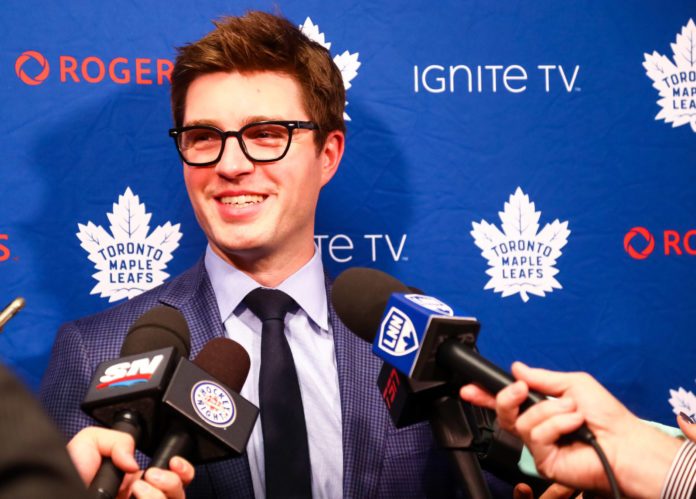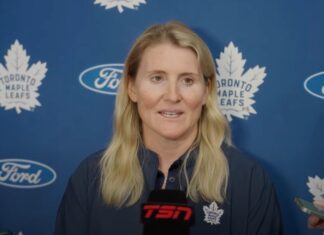
Kyle Dubas addressed the media after practice on Monday to discuss the status of his injured players, concerns about Jake Muzzin’s long-term health, the team’s play to start the season, and the job Sheldon Keefe has done behind the bench.
Kyle Dubas on the injuries to Jake Muzzin, TJ Brodie
Dubas: A general update: Obviously, there was the release earlier today on Jake Muzzin. He has a cervical spine injury. He will be re-evaluated with one of the specialists he saw in late February. We will provide an update at that time, but obviously, he is out indefinitely — at least until that evaluation, and then we will be able to dictate a course from there with regard to where things go with Jake.
We will continue to support him medically. He will stay around the team. We think, because of his experience not just as a member of our team here but his experience previously winning in LA, he can still bring a lot to our team. We are fortunate to have him and have him around.
TJ Brodie was placed on injured reserve today. He will be out a minimum of about two weeks is what we expect. We dealt with a similar thing with John Tavares earlier in the season — the same injury. We will continue to do what is right by him.
We have Mac Hollowell up and Pontus Holmberg up. We have Matt Murray trending towards [a return] this week or tomorrow, and Ilya Samsonov not far behind.
That is where we are at this point.
Kyle Dubas: Q&A
From what you have heard from the medical staff, what are the challenges facing Jake Muzzin if he is going to play again?
Dubas: It is a really tough one for me to answer. We haven’t dealt with this injury all too often in my experience with it being a cervical spine injury. With that, he has had two notable incidents on the ice — against Columbus in 2020 when we came back to play, and then this one here against Arizona. It is not something you want to really mess around with.
Unless he is 100% sure that this recovery time is going to allow it to settle and not be an issue, we have to do what is right for his long-term health. He is a father of two young children and a husband. We have to make sure we are doing right by him. As important as he is to us as a player, his health is paramount.
Is there a rehab process he is undergoing now until February?
Dubas: It is rest. He is going to continue to train, stay in shape, and stay around the team for all of the other things he adds in that regard, as I outlined. It is mostly rest and then going back to see one of the specialists there in LA at the end of February to kind of get a more clear picture of where it is at.
Are you expecting him to return?
Dubas: It is so hard. If we had any experience with this thing, I would stand up and give some semblance of a clear answer. Because of the nature of the injury and because we really don’t have a lot of experience with this type of injury — we are more relying on other sports that don’t replicate hockey exactly — it is hard to predict.
The cap relief that you would get would be temporary if he comes back, or it could be all season. How do you expect to fill the hole? Will you be aggressive on the trade market with the cap space? Will you wait until later in the season?
Dubas: We are always looking to improve the team if we can, but right now, in the short run, it is a great chance for us to really learn — we have some young defensemen who have earned more opportunities in Timothy and Rasmus — and see how much they can handle. With the increased opportunity, can they continue to elevate themselves as they each have in their respective starts to their careers for us?
That will be step one. Step two will be identifying — even if they elevate themselves — if it is going to be enough to help us really accomplish what we want to accomplish, and then we will evaluate the trade market and go from there. It is the usual course, but we are not in any real hurry to fill it. We want to see what these guys bring.
When Jake got hurt last year the first time in St. Louis and then again in Montreal, we didn’t have Mark Giordano then, either. We now have Gio, who adds that kind of veteran stability. I think as we go through the year, we will be really closely evaluating how it goes.
We also have Dahlstrom, who is an excellent depth guy for us and is out for the year as well. He is down, and Muzz will be at least until March if there is a return. It is an area we will be on the look out for. Our first step will be to allow our young people to thrive.
How encouraging is it not just that Matt Murray is returning tomorrow but how the goaltending has performed in his absence?
Dubas: The goaltending depth and defense depth have both been tested here — the goaltending one severely with Matt, Ilya, and Joe Woll all out.
Erik has come in, and same as last year when he came in… The thing about him is that when he has a poor performance or lets in a poor goal, he holds himself accountable and responds really well. That, to me, has been the most encouraging part of it.
With Matt out, Ilya stepped up. Hopefully, now we get back to full strength, but it is certainly very encouraging — and on the defense front as well as Muzz has been out since game four.
We hope to get everybody back to full strength and let everyone roll.
Is there an update on Joe Woll’s status?
Dubas: He had a bit of a setback with the shoulder. In his recovery, he sustained a bit of an ankle injury. He is slated to participate tomorrow with the Marlies in full practice. To me, that is a positive sign. With what he is coming back from, we just need to continue to be patient. We are hopeful that in the next two or three weeks, he can be back up to full practices, get cleared, and get rolling again as well.
With the injuries we have been talking about, there has been a lot of adversity early in the season. What is the general sentiment on how the first part of the year has gone for the team?
Dubas: It may come off as strange, but in my role with the team, I personally think going through these types of things — whether it is injury or poor play that results in some consternation about where we are at — is a very positive thing. You learn a lot about the people you are with day in and day out. You learn who can handle it and who may not be able to.
Coming back off of that Western road trip where we did not play well, I thought our guys did an excellent job here the whole week at home in getting ready to roll and putting together a really good week. Last week, on the Saturday night going into the second period, we are down again. Rather than let that start to snowball, they dug in and found their way.
That, to me, is very encouraging. If you look around the league, it is so close right now. There are maybe three or four teams that would be really happy with the way they have started unequivocally. The others have been a bit up and down.
To me, it is good to see that. At some point in the year, you want to know if your team will be able to handle it and how they handle it. We will have more of it, but for us, when it does happen, are we able to find our way through it and come out the other side?
How do you think Sheldon Keefe has handled what has been a pretty pressure-packed first month of the season?
Dubas: Oftentimes, when people view it, whether it is getting upset with the officials or voicing his concerns about certain players or certain groups of players on the team, they take it to mean there is a bit of a coming-unglued way about it. To me, with the way he has handled it, everything is done with a purpose. There is never anything about him that isn’t purposeful.
In my time knowing him and working with him, when things are not necessarily perfect, he finds a way to be at his best and get the most out of the group. The thing for me about Sheldon that has been most encouraging in working with him, even as we have gone through this season where we have had stretches where we haven’t played as well: The group responds to him.
On Saturday night, it would be another example of that after the first period. After the road trip out to California, where we didn’t have a strong finish to the trip whatsoever, we came back home and were able to find our game again. That, to me, represents the way the players respond to the coach.
It is always very encouraging for me to see. He is always adapting and trying to change the way he does things to make sure he is always getting through to the group.
































